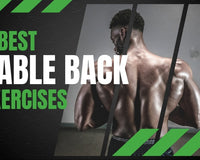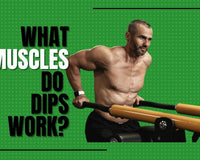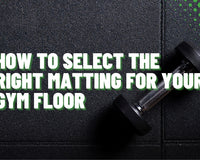A weight bench is an essential and versatile piece of equipment that will help you build strength and will be a key part of your home gym.
With that being said, as a beginner, you might not know exactly what to look out for when buying a home weight bench.
Well, that's exactly what we're here to help you with today, to provide you with the ultimate buyer's guide on choosing the best bench for a home gym.
We're going to discuss the various types of benches you can get, as well as the most important features you need to look out for.
Let's get to it and help you find the best bench for a home gym.

Different Types of Weight Benches for Home Use
The first thing you need to know is that there are a few different types of benches that you can buy.
Which one you choose depends on your budget, space, workout goals, and other factors.
Below, we have the most common types of weight benches and what they are best used for.
Flat Weight Benches
First, we have flat-weight benches, which are the most common and straightforward type. These provide you with a flat and stable surface to perform many different exercises.
These are great for foundational exercises such as dumbbell rows, core exercises, and bench presses. The flat benches are well known for their stability, making them best for heavy lifting.
They generally feature a thick steel frame and great padding to support you as much as possible during intense workouts.
Flat benches also tend to be quite affordable compared to speciality or adjustable benches.
With that being said, flat benches are limited in terms of having a fixed position.

Adjustable Weight Benches
Next on the list, we have adjustable weight benches, which are extremely multi-functional and versatile, as they allow you to modify the angle of the backrest so you can perform flat, decline, and incline exercises.
If you're looking to target a variety of muscle groups, then this adjustability is exactly what you need.
You can adjust the bench to an incline setting so you can emphasise your shoulder and upper chest movements, while the decline position is best for targeting your core and lower chest.
Overall, adjustable benches generally have multiple angles, usually ranging from 15° to 85°, allowing for precise control over your workout.
Adjustable benches are more expensive than flat benches, but their versatility makes them worthwhile.
That said, ensure that you get a sturdy model because that locking mechanism needs to be secured to prevent it from giving out while lifting heavy.
Olympic Weight Benches
We then have Olympic weight benches, which are the number one choice for those who are serious about lifting such as powerlifters.
A good quality Olympic bench will be extremely robust, strong, large, and built to handle extremely heavy loads. They have catches built into them to hold an Olympic barbell ready for you to perform movements such as bench press.
There are several cheaper models available on sites like Amazon that will also have extras such as a preacher curl pad and leg extension.
This helps add a lot of versatility to your workouts, making the Olympic bench one of the best options if you're just getting started and don't have room for a full power rack set up yet.

Olympic benches do however have their drawbacks, such as their heavyweight and large size, which makes them not very portable and unsuitable for small spaces.
When looking at Olympic weight benches try to get ones that have the barbell catches far apart as this will make it easier to load weight onto the bar without it flipping over.
Olympic benches with the catches close together can feel awkward to use as you unrack the weight and sometimes the uprights restrict your shoulders.
Folding Weight Benches
Next on the list are folding-weight benches, which as the name implies, fold flat for simple storage, making them ideal for shared living spaces and small apartments.
These are easy to move and lightweight, yet still provide you with a relatively solid platform for numerous exercises.
With that said, they're not quite as strong or able to handle heavy loads as flat benches or Olympic benches, but they can still support moderate weight and provide you with decent stability for most average home workouts.
However, they do have reduced weight capacity compared to many of the other models we've looked at, and they generally don't have advanced features either.
Specialty Weight Benches
Last but not least, we then have speciality weight benches, which are designed for specific training or exercise styles. This makes them best for targeted workouts.
For instance, there are preacher curl benches for bicep isolation, ab benches for core training, and even hyperextension benches for lower back strengthening.
Although most people would not consider these to be regular weight benches, such as those that you would do bench presses on, they are still considered weight benches.

Factors to Consider When Buying a Home Weight Bench
Before you choose from any one of these types of weight benches, there are a few different considerations that you need to keep in mind.
Here are all of the main features that you need to consider before you purchase a weight bench.
Weight Capacity
Perhaps one of the most important features to pay attention to when choosing a home weight bench is the weight capacity.
For instance, if you're looking to do some moderate exercise, a beginner's weight bench with a capacity of up to 500 lbs is more than enough.
However, if you're an intermediate or advanced lifter, you'll want to go with a bench that has a weight capacity of at least 600 lbs.
If you are trying to calculate what capacity you will need, don't forget to include your body weight and the weight you are lifting as the bench needs to be able to support the total combined weight.
More so, it's always important to choose a weight bench that has a much higher weight capacity than you ever plan on testing. This will ensure that no matter what lift you do, the bench in question will be able to hold you up.
Flat vs. Adjustable
You then need to consider the flat versus adjustable bench debate.
Of course, flat benches are great for any type of exercise that has you lying down flat on your back as they're extremely robust and strong.
With that being said, their lack of adjustability means that you can't do any incline or decline exercises on them.
Adjustable benches are in this sense far more versatile and allow you to do many more exercises, but do keep in mind that the adjustment mechanism may at times form problems or act as a weak spot. There is of course a definite tradeoff to consider here.

Material Quality
Another important factor to pay attention to is what the materials are.
For instance, as far as the frame of a weight bench is concerned, you want to try and check the thickness/ gauge of the steel used.
Budget home benches will typically use thinner 14 or 15-gauge steel (1.897mm to 1.709mm). Whereas good quality commercial benches will typically use 11 gauge (3.038mm) steel that is much stronger.
You also want to make note of the finish of the steel. A powder coat finish is our top choice as it can withstand being knocked and is very durable. But it does cost more than a standard paint finish.
Moreover, you then also want to look for very thick and high-density foam padding to provide you with great comfort and reduce pressure on your body.
The upholstery over top should also be sweatproof and tear-resistant. Leather is a good choice but tends to cost more but some of the Vinyls are quite good quality nowadays.
Size and Storage Features
Yet another factor to pay attention to when choosing a home weight bench is the size of it.
Of course, the larger the bench is, the more types of exercises you can do on it, but on the other hand, it also takes up more space.
Therefore, you need to consider how much space you have to spare in your home.
Moreover, there are some benches that fold down into a much more compact package, so you can easily put them in a closet or under your bed.
Just keep in mind however that folding benches tend to not be the most durable and often start suffering from problems far sooner than other varieties.
Base and Stability (Pad Height & Width)
When you are lifting a whole lot of weight, you need that bench to be stable.
This means that you need to look for a weight bench that has a wide base with long legs combined with non-slip rubber feet.
Plus, you want the pad to be wide enough that it provides you with support but not so wide that it restricts your movement.
For example, the International Powerlifting Federation specify a bench pad should be between 29cm - 32cm wide and 42cm to 45cm high to the top side of the pad.
We generally try to find benches in these ranges as they are the most comfortable to use.
If you have an adjustable bench, there should be an extremely secure locking mechanism to prevent it from giving out or wobbling during use.
Price
The final factor is the price and your overall budget.
If you have the money to spare, we do recommend investing in a high-quality bench, especially if you plan on progressing to heavier weights. This will help keep you safe and provide you with a good foundation to lift from.
However, for beginners just looking for a moderate workout, something more cost-effective will likely be your best choice. Just keep an eye on the features we mentioned above and you can find good quality benches that won't break the bank.
Final Thoughts on Choosing a Weight Bench for Home Use
At the end of the day, having a weight bench in your home allows you to work out virtually every muscle in your body.
With the right type of workout bench, as well as suitable features, you can find the best home weight bench for your needs.
Just remember to take all of the above considerations into account, and you should be able to choose a model that works just fine for you.





